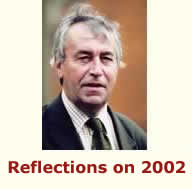
Michael Drake Agricultural editor of the Belfast Telegraph looks back on the farming year in Northern Ireland.
While farmers may have had something of a respite in 2002, not
having to contend any longer with the difficulties posed earlier by Foot and Mouth, the year was not a good one for many. The months ahead
will also bring their problems for all who labour the land but it is the expectation of most they will make a
living. Whether or not it is a better one than last year is hard to predict.
With incomes at rock bottom would it be presumptuous to say things will improve. As hundreds of farmers leave the land Northern Ireland
faces serious social, economical and environmental problems. Startling statistics from government last autumn revealed how a major drift from the land was affecting the
industry. No less than 1,300 farmers had closed their gates in the previous twelve months and said goodbye to the province's largest
industry.
Ulster Farmers Union president John
Gilliland summed it up when he told me: "I am gravely worried but not surprised by these statistics.
"Farmers have been earning below the national minimum wage for the past five years and stress levels are at an all time high" Eight years ago our farmers enjoyed the second highest incomes in Europe. Now they are the lowest.
Conscious of the effects all this is having on the industry the Ulster Farmers Union launched its CARE,
Campaign against Rural Exodus, exercise across the province. Here, there and almost everywhere CARE banners and signs were to be seen.
What it attained is difficult to guage.
Then again it was an exercise which had to be mounted. Better to have done so than done nothing at all.

According to government statistics total income from farming in the UK
is forecasst to have risen by 9% in to around £10,700. Few would
suggest this had happened in Northern Ireland. In fact it is possible,
when everything is calculated farm incomes here will prove to have been
lower in 2002 than in 2001.
The loss of former Farm Minister Brid Rodgers with the ending of devolution
brought a direct rule minister, Ian Pearson to the province. While contending
he was no caretaker minister his opponents were saying otherwise. In a
short time, however, he did prove he
could be a 'hands on minister'.
In the wake of draconian fish quota restrictions imposed by Brussels he
set up a task force to help the good fisherfolk of Kilkeel, Ardglass and
Portavogie deal with the subsequent problems caused. But in the months
since her departure from the farming scene many still bemoan Brid Rodgers'
passing. The months under her control were not golden ones for agriculture
in Northern Ireland. But few would complaint about the role she and her
team had played in helping to stem the spread of Foot and Mouth throughout
the province.
Most farmers would welcome again a home grown, home spun minister to overlord
their industry. Early in the year farmers were fighting for a fairer deal
from the supermarkets.
By the end of the year they were still frustrated by their returns from
the market place. Today I don't believe they are in any better position.
Ulster Unionist Assembly member Billy Armstrong was calling for a 10 year business plan to give farmers a 'sense of direction' to the future.
There were worries too about the advent of the Euro which pundits stated would create serious exchange rate problems.
Young farmers went to see Brid Rodgers - when she was in office - to tell her the stark facts about trying to claim a living from the land. They claimed farmers would be paid five times more if they worked in another indutry. No one doubted them but little has changed in twelve months.
Minister Rodgers in the spring time launched a new Counter Fraud Strategy in an attempt to curb those who was continually taking advantage of her depart-ment. She made many promises about the consequences for those who were caught and convicted. Fraud goes on but the minister has left the scene.
Who can recall last year without mentioning the weather and the rain. Labelled the worst in living memory it brought misery to all. But in rural areas it brought more problems than anywhere else.
With the approach of spring time farmers are still feeling the effects of the weather. Wet fields and low foddar stocks are the order of the day. However, there is still a ray of sunshine on the horizon. When last we had such a year it was followed by an exceptionally dry one. Here's hoping.
Editors Note :
A fascinating book on the history of Northern Ireland agriculture,
Breaking New Ground - fifty years of change in Northern Ireland agriculture 1952 -2002
has been written by Michael and Derek W Alexander. It is published by Blackstaff Press and reviewed elsewhere on this portal.